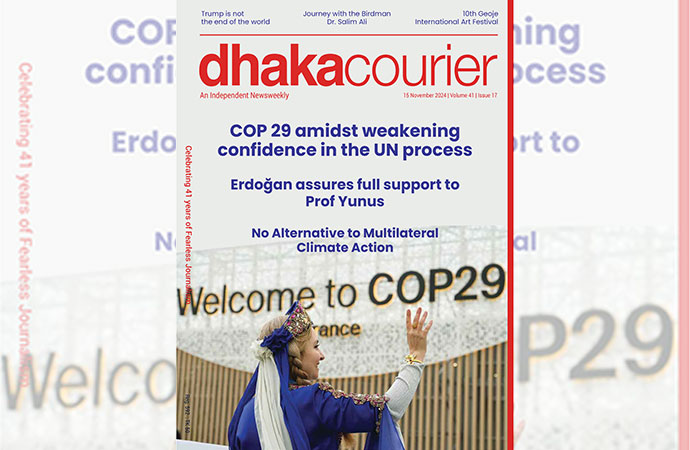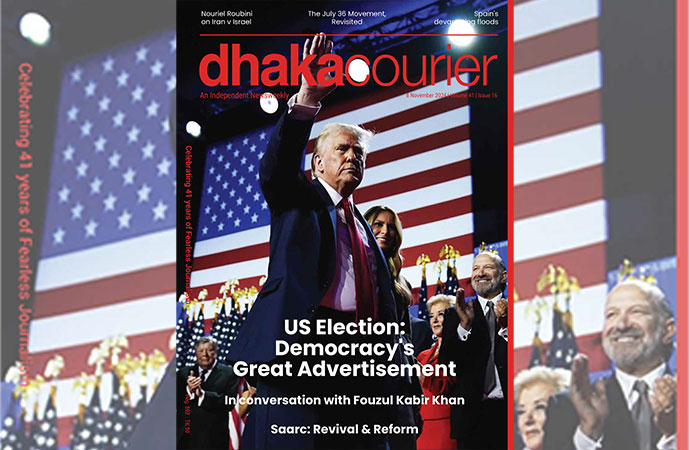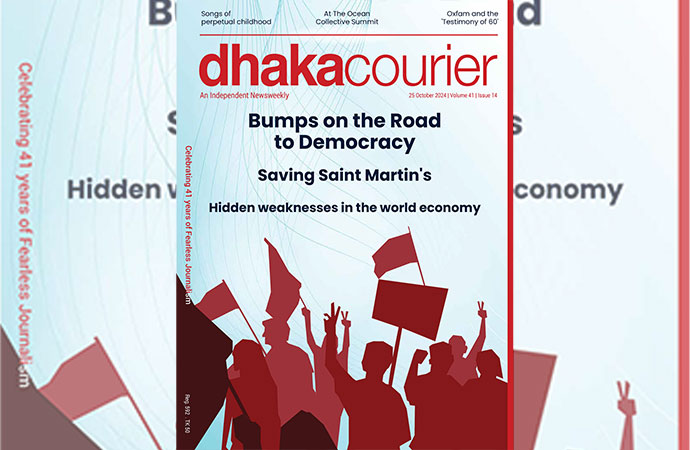Reportage

Chinese Ambassador to Bangladesh Yao Wen. Photo: UNB
It would definitely add new momentum in our bilateral relations, he told Dhaka Courier
Chinese Ambassador to Bangladesh Yao Wen has said the Johannesburg meeting between Prime Minister Sheikh Hasina and Chinese President Xi Jinping showcased for one more time to the world the example of relations between developing countries jointly set up by Bangladesh and China.
"It was the first face-to-face meeting between President Xi Jinping and Prime Minister Sheikh Hasina since the latter's formal visit to China four years ago. We have long been waiting for this meeting. It would definitely tide up new momentum for our bilateral relations," he told Dhaka Courier in his first interview since his arrival in Dhaka late last year, noting that it is his sacred mission to fully implement the consensus reached by the two leaders to push the "Strategic Partnership of Cooperation" between the two countries to a new level.
As briefed by Ambassador Yao, Prime Minister Sheikh Hasina and President Xi Jinping spoke highly of the traditional friendship and good relations between Bangladesh and China "based on mutual respect and non-interference in each other's internal affairs".
They reassured mutual support on issues of respective core interests.
Satisfied by joint achievements made under the umbrella of Belt and Road cooperation, the two leaders vowed to further strengthen integration of development strategies, deepen practical cooperation in various fields, and enhance all-round exchanges, so as to bring more benefits to the two peoples.
During this meeting held on the sidelines of the BRICS summit, Bangladesh showed interest in strengthening cooperation with China in the bloc and other multilateral mechanisms.
The Chinese leader congratulated Bangladesh on joining the New Development Bank, and vowed to enhance coordination and cooperation with Bangladesh in multilateral affairs to safeguard international fairness and justice and serve the common interests of developing countries.
"From the minute of the meeting, all we read is mutual support and joint cooperation, with no hint of any difference," said Yao, stressing that interactions between top leaders provide political and strategic guidance for development of bilateral relations, the importance of which would never be exaggerated.
"It is high on my agenda to facilitate more in-person visits and meetings of this kind in the days to come," he added.
Relations in Challenging Situation
Ambassador Yao said China and Bangladesh share significant commonalities in terms of moral values, national dreams and development paths.
"Since President Xi Jinping and Prime Minister Sheikh Hasina jointly upgraded our bilateral relations to Strategic Partnership of Cooperation in 2016, we have set a model of friendly ties between developing countries for the world at large," he said.
China now stands as the single largest trade partner and a key development partner of Bangladesh. "Wherever I go in Bangladesh, the local people would always give me thumbs-up for China-Bangladesh friendship," the ambassador said.
At international arenas, China and Bangladesh both stand for peace and development. "We share similar views on hotspot issues like the Ukraine crisis. China's effort to help resume Saudi-Iran diplomatic relations was also welcomed in Bangladesh," he said.
"China is working with Bangladesh in meeting regional and global challenges, such as the repatriation of displaced people from Rakhine State of Myanmar, tackling climate change, upholding the right to development, and supporting the UN peacekeeping efforts," the envoy added.
"Based on equal footing, mutual respect, joint development and common commitment to peace, relations between China and Bangladesh infuse the power of certainty and stability to an increasingly trembling world," he said.
Non-Intervention in Upcoming Election
"China supports Bangladesh in safeguarding national sovereignty, independence and territorial integrity," President Xi said in the Johannesburg meeting, adding that China upholds Bangladesh's efforts to fend off external interference and maintain domestic unity and stability, so as to ensure development and revitalization.
Yao said the upcoming election is an internal affair of Bangladesh, and their policy is very consistent that China never intervenes in any country's internal affairs.
"The future of Bangladesh shall be determined by the Bangladeshi people," said the ambassador adding "China is full of confidence for the better future of Bangladesh as well as China-Bangladesh relations."
For the time being, over 600 Chinese enterprises are functioning in Bangladesh, and tens of thousands of Chinese citizens are living and working here.
According to Ambassador Yao, the Chinese companies proactively undertake social responsibilities on boosting local economy, protecting the environment, providing social services to host communities, help create job opportunities, build capacity for manpower and promote charity. "With their contribution and efforts, the hearts of the two peoples are brought together ever closer," he said.
When asked whether he is concerned about the interests of Chinese companies and citizens in the context of heated political air, Yao replied that the Chinese people are here for friendship and joint development with Bangladeshi people. "Their safety and security should surely be guaranteed, and their lawful interests should be protected," he opined.
Priorities Ahead
Bangladesh and China will celebrate the 50th anniversary of diplomatic ties in 2025. "It would be a perfect occasion to review achievements in the past and map forward for the future," the ambassador said.
He promised that China would do its part to help Bangladesh to graduate from the LDCs by 2026, and fuel up joint development to achieve respective national dreams which are "well-connected".
"Practical cooperation is the cornerstone of China-Bangladesh relations. While implementing projects agreed during high-level visits back in 2016 and 2019, we will take the initiative with Bangladesh to figure out more under the Belt and Road Initiative (BRI) and the Global Development Initiative (GDI) on connectivity infrastructure, renewable power section, blue economy, digital empowerment, so on and so forth," said the Chinese envoy.
In terms of trade, he said, local exporters are encouraged to fully leverage China's 98% zero-tariff treatment for Bangladeshi products and showcase the brand of "Made in Bangladesh" on expositions held in China, such as China International Import Expo, China-South Asia Expo and Canton Fair.
The Chinese Economic and Industrial Zone in Chittagong should eye on high-end and high-value industries to serve the Smart Bangladesh development strategy as well as the high-quality development paradigm of China, he said.
"We'd encourage Chinese entrepreneurs to increase investment in promising fields like new energy, ICT, advanced manufacturing, and agri-product processing," Ambassador Yao said, adding that he would also push forward the cooperation on disaster management and relief, military exchanges, law enforcement coordination and maritime cooperation during his tenure in Dhaka.
"Of course, as the Chinese ambassador, I'd play my role in mediating between Bangladesh and Myanmar to facilitate the early and sustainable repatriation of displaced people from Rakhine State," he underscored.
BRI Project
"The Belt and Road Initiative has brought about tangible benefit for the Bangladeshi people," Ambassador Yao said, "Prime Minister Sheikh Hasina described BRI a 'trailblazer' for Bangladesh's development."
This year marks the 10th anniversary of the launching of BRI and the 7th anniversary of Bangladesh's participation in the initiative.
"In recent years, we've witnessed completion of a good number of projects built under the BRI that have significantly changed the development landscape of Bangladesh, such as the Info-Sarker phase 3 project, the Bangabandhu Bangladesh-China Friendship Exhibition Center, the Payra Thermal Power Plant, the Dasherkandi Sewage Treatment Plant, among others," he said.
"Connectivity will be further improved between the Southwestern part and the rest of the country when the Banglabandhu Sheikh Mujibur Rahman Tunnel under the Karnaphuri River and the First Section of the Padma Bridge Railway Link open for traffic by the end of this year," he noted.
Asked about the latest status of on-going development projects, he said that projects like Modernization of Telecommunication Network for Digital Connectivity and the Installation of Single Point Mooring with Double Pipeline Project will be completed soon.
"The Rajshahi WASA Surface Water Treatment Plant will start its construction, and the Teesta River Comprehensive Management and Restoration Project is also under discussion between authorities of the two sides," he added.
Global Development Initiative
The Global Development Initiative (GDI), a twin sister of BRI, is said to be aimed at supporting the timely achievement of all 17 Goals of the 2030 Agenda for Sustainable Development by revitalizing global development partnership and promoting stronger, greener and healthier global development.
Chinese President Xi Jinping put forward GDI at the United Nations in 2021. It promotes international cooperation in eight priority areas, namely poverty alleviation, food security, pandemic response and vaccines, financing for development, climate change and green development, industrialization, digital economy and connectivity in the digital-era.
"All these are also the focus of Bangladesh in its Vision 2041 perspective plan," said the ambassador.
According to the United Nations, over 100 countries and international organizations have expressed their support to the initiative and 68 countries have joined the Group of Friends of the GDI at the UN.
This July, the first high-level meeting of the Global Action Forum for Shared Development was held in Beijing, with more than 800 guests from 158 countries and international organizations attending online and offline. Minister of Planning M.A. Mannan took part in the event on behalf of Bangladesh.
"It is hoped that Bangladesh would make good use of China's aid, preferential loans and the Global Development and South-South Cooperation Fund to actively carry out policy dialogue, experience sharing, capacity building and practical cooperation," said the ambassador.
Producing Green Energy
Responding to a question, the envoy said China, a key contributor to the Paris Agreement, pledged to peak its carbon dioxide emissions by 2030, and to reach carbon neutrality by 2060.
"By 2035, China will broadly establish eco-friendly ways of work and life, lower carbon emissions after reaching a peak, improve the environment and largely accomplish the goal of building a 'Beautiful China'," he added.
Bangladesh also faces critical challenges of environmental degradation and climate change.
"Fortunately, the country has become well aware of the gravity of these issues, and has taken plausible actions," the Chinese envoy said, noting that the Mujib Climate Prosperity Plan (MCPP) adopted in 2020 plays a key role in guiding the country's development paradigm into the track of green transition by 2030.
"As Bangladesh and China converge on environmental goals, there heralds significant potentials for the two countries to synergize on green development strategies, thereby building a shared human community in harmony with nature," said Ambassador Yao.
"In fact, we've already kicked start cooperation in this regard. When I visited Cox's Bazar a few months ago, I saw photovoltaic panels of Chinese brand on top of many roofs. A wind farm project is also being built there by Chinese contractors," he added.
Next Generation of Green Traffic
It was reported that Bangladesh had its first electric vehicle (EV) charging station installed in Dhaka earlier this month.
"I read it from newspaper. But there are only 35 EV registered in Bangladesh for the time being. That is a negligible amount compared to the 170 million population of Bangladesh," he said.
China is a key designer and manufacturer of EV. There are over 16 million EV and mixed-fuel vehicles running on the road of China, and the number is still soaring up.
"We would encourage more Chinese EV manufacturers to come to Bangladesh, explore the local market, and meet the demand of Bangladeshi people, thereby helping Bangladesh transit towards the next generation of green traffic," said the ambassador.
People-to-People Exchanges
In the interview, Ambassador Yao said people-to-people exchanges lay the foundation for Bangladesh-China friendship.
Earlier this year, Chinese President Xi Jinping replied a touching letter to Alifa Chin, a Bangladeshi teenager born with the help of Chinese navy hospital ship "Peace Ark" and named after China by her father. Expressing his hope that Chin would make best use of her youthful years and study hard to make her dream come true, President Xi encouraged her to give back to her family, contribute to the society, and serve her own country.
"President Xi Jinping's reply letter to Alifa Chin ushers in a new chapter for the intimate relations between the two peoples. From this start, we'd further enhance people-to-people exchanges between us," said the ambassador.
As of now, there are more than 12,000 Bangladeshi students studying in China. Three Confucius Institutes and classrooms are functioning in Bangladesh. The Chinese envoy sees them as "seed and hope" for enhanced mutual understandings.
"The local media also play a unique role in influencing public opinion and bridging recognition gaps. It is my sincere hope that prominent media houses like UNB would keep producing objective and fair reports about China and China-Bangladesh cooperation, thereby contribute to the betterment of friendly ties between our two countries and peoples," he said.
Those who claim situation in Myanmar 'not conducive' for repatriation never visited Rakhine
Highlighting the importance of joint global efforts to realize repatriation of the Rohingyas, Chinese Ambassador to Bangladesh Yao Wen has said those who keep claiming situations in Myanmar "not conducive" for repatriation have seldom visited Myanmar's Rakhine State.
"It's quite strange. And they didn't answer the question whether situation in Cox's Bazar is right for the displaced people to live a decent life. This is something they have to ask themselves," he told Dhaka Courier in an exclusive interview.
The current influx of Rohingyas took place on August 25, 2017, which has seen its 6th anniversary Friday.
"The Rohingya issue has plagued Bangladesh and Myanmar for long. Over the years, Bangladesh has made great sacrifices by sheltering these displaced people. However, the security situation in the camps is deteriorating rapidly," said Ambassador Yao, noting that killings, gun fights, kidnapping, drug and human trafficking are rampant in the Cox's Bazar camps.
"External assistance is also heading down. The food ration for the displaced people has been reduced from 12 to 8 US dollars per person per month, which is far from enough for sustaining lives," he added.
Saying that all parties have increasingly realized repatriation is the only way out, the Chinese envoy stressed that Prime Minister of Bangladesh Sheikh Hasina has also repeatedly expressed her firm resolve and determination for repatriation.
"Though the Rohingya issue is by nature a bilateral one between Bangladesh and Myanmar, China, as a common neighbor of both countries and permanent member of the United Nations Security Council, supports the two sides to settle differences through friendly consultations, so as to maintain peace and stability in the region," said the ambassador.
In 2018, China put forward the three-step proposition on improvement of situation in Rakhine State of Myanmar, namely to "stop violence, start repatriation and focus on development."
"Over the years, China has offered tremendous help within its capability," said the ambassador, "We have urged Myanmar to improve the security situation in Rakhine State, helped Bangladesh and Myanmar promote conditions of repatriation and resettlement facilities, provided good office for direct talks between Bangladesh and Myanmar, and called on the international community to encourage and support both sides," he elaborated.
According to him, China's mediating and facilitating role has won respect, recognition and trust from both Bangladesh and Myanmar, and helped the two countries enhance their trust on each other.
Something positive seems to be happening.
This year by far, Myanmar has shown stronger will and increasing flexibility to take back some of the displaced people, according to the Chinese envoy.
"We have witnessed several historic breakthrough in the past few months. For example, upon invitation by the Myanmar side, representatives of displaced persons and officials of the Bangladeshi government conducted the first ever go and see visit to Rakhine State. Myanmar also sent a working group to Cox's Bazar to talk directly with the displaced persons and introduce to them the scenario after returning to Rakhine," he said.
Under the mediation of China, Bangladesh and Myanmar have kept in close contact and communication to nail down technical details concerning the first batch of repatriation, he added.
Talking about those who are obstructing repatriation, the ambassador said those actors neglect the joint efforts made by both Bangladesh and Myanmar.
"We call upon all the stakeholders to make concerted efforts to fulfill the objective of repatriation, since there is no other alternative," he said.
It is noteworthy that high-ranking diplomats of Bangladesh have also made intensive remarks recently, calling for understandings and support from the international community.
"Our priority is that they (Rohingyas) will return to their homeland. Myanmar is also willing to take them back," said Foreign Minister AK Abdul Momen recently, noting that Myanmar needs to ensure safety and security of the Rohingyas after their return to their place of origin.
State Minister for Foreign Affairs Md Shahriar Alam earlier said no one should create a barrier to trial repatriation of the Rohingyas to Myanmar, noting that such trial repatriation will help understand issues before a large-scale repatriation.
"This trial repatriation is to know the areas of problems before the large-scale repatriation. It will help examine the issues for better designing a regular repatriation initiative. No one should create a barrier," he told reporters.

























Leave a Comment
Recent Posts
Unity to tackle climate change ...
There is no doubt that climate change is occurring and has the potenti ...
Mismanagement and overcrowding ...
Dhaka Medical College Hospital (DMCH), one of Bangladesh’s large ...
Remarkable achievement for Bangladeshi artists at th ..
We need new economic framework that serves planet, p ..
Prof Yunus calls for mobilising "intellectual, finan ..
Bangladesh, India, Nepal, Bhutan should think of cre ..